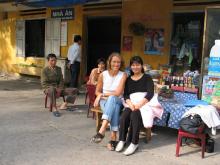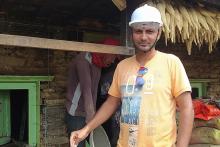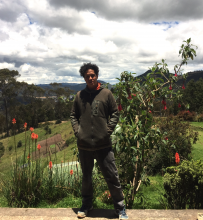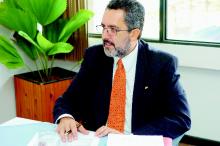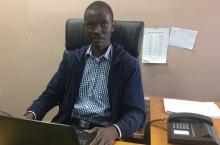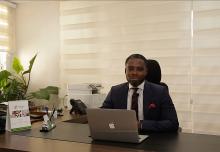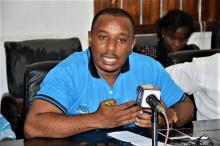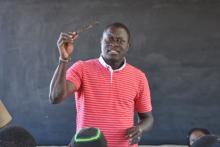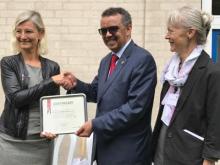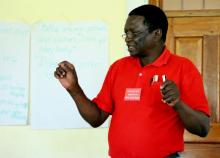Despite being more than 10,000 kilometres apart, Professor Tine Gammeltoft and Danida alum Dr Nguyen Thi Thuy Hanh’s lives and careers are deeply intertwined.
John Kinyage, Tanzania. From Hirtshals to Morogoro: Improving aquaculture
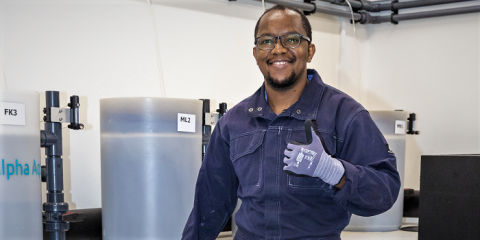
By Tanja Kronvald Elfstrøm, DTU Aqua
Danida alumni and former DTU student works to develop and improve the aquaculture industry back in Tanzania as well as in Denmark.
Seven years ago, John Kinyage from Tanzania made a huge decision and accepted a Danida scholarship to pursue an aquaculture master education at DTU Aqua in Denmark. His journey has given him valuable academic and practical experience with sustainable fish farming technologies such as recirculating aquaculture systems (RAS). With his own RAS based company, he is working for developing and improving the aquaculture industry in Africa.
In 2015, he graduated with the MSc Programme in Aquatic Science and Technology at DTU. Since then, he has been employed as a scientific assistant at DTU Aqua in 2017 and in 2020. His research has led to scientific publications, which have received attention not only from the academic society. Now with a well-developed network with industrial and scientific colleagues, he pursues to implement, develop, and improve aquaculture technologies in Tanzania.

Started a company in Tanzania
Aquacom Limited is a company in Tanzania founded by John Kinyage. The company provides services and technologies to the aquaculture industry. It provides products such as recirculating aquaculture system (RAS) for small-scale projects as well as playing key roles in commercial aquaculture investments in Tanzania. The vision is to stimulate the growth, productivity and competitiveness of the aquaculture industry in Tanzania and in Africa.
"One of my proud contributions to the aquaculture industry in Tanzania is being part of a lead team as technical expert in developing a 10 years National Investment Plan for Aquaculture and Fisheries 2019-2029," he tells.
Recycling technology
An important part of the plan in Tanzania is the identification and adoption of appropriate and sustainable fish farming systems such as developing the use of RAS technology (recirculating aquaculture system). RAS is simply a concept that allows fish production with reduced water use and allows control of important rearing conditions such as oxygen concentration and pH. Mechanical and biological filtration removes toxic waste from the water, and afterwards, the water can be recycled.
RAS opens up many opportunities where water resources are limited as it keeps the water clean and ensures a healthy environment for the fish. RAS technology has shown positive results such as improved fish quality, reduced disease outbreaks, and reduction of environmental impact.
Sharing knowledge about RAS with each other
As a student at Aquatic Science and Technology and at DTU Aqua’s research projects, John Kinyage achieved knowledge about the recycling technology among other skills, which he is still using today:
“Due to the standards in the projects, I learn what the industry expects us to provide. With this knowledge, it is easier for me to improve my company and the industry in Tanzania."
He continues:
"I appreciate my colleagues at DTU Aqua as they have great knowledge. They are very helpful, which makes a perfect environment for me to immerse deeper into the industry working with advanced technologies. Compared to Tanzania where the industry is at an early stage of development, I have fewer support options and less room for errors. So it is important to learn from my colleagues in Denmark, so I can come up with customized solutions that work in an African environment."
Working in the aquaculture industry in Denmark
In 2020, John Kinyage travelled to Denmark to participate in DTU Aqua’s biofilter project. He worked on the the project as a scientific assistant responsible for preparing, implementing, analyzing, and organizing the research. During eight months, he has worked with senior researchers from DTU Aqua in undertaking standardized performance tests on biofilter products from leading providers of aquaculture technology in Denmark.
"We are testing the products to see how they perform under extreme conditions. With the results from the project, the industry can improve their knowledge on which products are the best for a particular purpose in RAS, expand customer’s choice options with a new biofilter media type, and provide recommendations for product improvement," explains John Kinyage.
A scholarship from Danida started it all
Three times during the last four years he has been in Denmark, but it was because of Danida he came to Denmark the first time. Danida has a programme, Building Stronger Universities (BSU), where Danish and African universities through collaboration build capacity in education, research, and administration. One of the activities in an early phase was to provide MSs Scholarships in Denmark for African students.
One of these students was John Kinyage, who chose to study at DTU with Danida even though he was offered different scholarships in different countries:
"Aquatic Science and Technology at DTU was the perfect match for me based on my background and future goals with aquaculture. Without Danida, it would be too expensive for me to travel to Denmark and study my desired education."
Being away from family and friends
Working in Denmark means time away from family and friends in Tanzania.
“This is something I have to sacrifice for a short time, and afterwards I can return to my loved ones. It is the hard part but it has become easier as I now have a good network in Denmark,” John Kinyage tells.
Although, the experience was a little different this time due to COVID-19. The period in Denmark was extended and a lot of new restrictions and uncertainty affected the situation. However today he is back with his family in Tanzania, where he continues the work in his company to improve the aquaculture industry.
His former supervisor and now a colleague at DTU is looking forward to following the process:
“John has conducted a lot of experiments, which gives him a strong foundation to identify industry needs, options, and challenges and is able to address them by sustainable solutions,” says Senior Researcher Lars-Flemming Pedersen.
